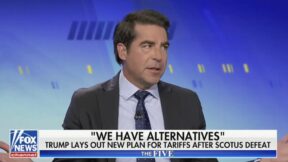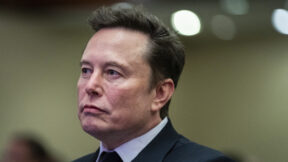Bernie Sanders Brags About 1988 Jesse Jackson Endorsement…But Urged Primary Against Obama in 2011
During an interview this week, Independent Vermont Senator and Democratic presidential candidate Bernie Sanders offered his 1988 endorsement of Rev. Jesse Jackson‘s historic candidacy as an example of something he’s done for black people, but in 2011, he also suggested mounting a primary challenge to President Barack Obama, our nation’s first black president.
On Monday’s edition of The Breakfast Club, co-host Charlamagne Tha God asked Sanders ” When we talk about your record with black people, what examples can you point at to show black people ‘This is what I have done, specifically, for issues that deal with y’all?’”
Sanders cited his civil rights activism in the 1960s, and said “In 1988, I was one of the few white public officials who supported Jesse Jackson for president of the United States, and he ended up winning Vermont.”
Asked for specific legislative examples, Sanders replied “Well, legislation that benefits African-Americans, yeah, but not specifically, you know, we passed legislation that benefits working people, sure.”
Sanders did, in fact, endorse Jackson’s historic 1988 candidacy, and two years prior to that, Rev. Jackson endorsed Sanders’ candidacy for governor of Vermont, which Sanders neglected to mention during the interview.
And Rev. Jackson did, indeed, win Vermont in 1988 by a narrow margin, thanks in part to the City of Burlington, of which Sanders was then the mayor. And according to The New York Times, Sanders even endured a literal slap in the face over his vote for Jackson at the state convention:
One voter, Helen Malloy, yelled from the back of the auditorium, ”We want unity among ourselves, not with a group of outsiders.”
Several minutes later, she approached Mayor Sanders as he was returning to his seat after casting his vote and slapped him on the cheek. The Mayor, who at first appeared to think that the woman was about to greet him, looked stunned.
”I don’t think that was very nice,” he told her.
During a 1988 C-Span interview, Sanders said that of all the candidates running, “the only one who makes sense to me is Jesse Jackson,” and later in the program, explained why he thought Jackson could win:
What Jackson has going against him is not primarily, in my view, is not primarily that he’s black. I mean, there are some people who won’t vote for somebody who’s black, and that’s that. That’s a minority.
And I think one of the changes, if people think I’m dumping on the United States, let me say that one of the nice changes that has taken place in the last twenty to thirty years is that, in fact, a person like Jesse Jackson can run for president of the United States and be taken seriously. Who would have thought about that twenty years ago? A black person running.
I think the issue is not a racial issue. I think it’s a class issue. I think if you had a conservative black person, somebody like Mayor Goode of Philadelphia running – I think the business community would put money into his campaign and would say, boy! It’s time for a black President. The real issue is not whether you’re black or white, whether you’re a woman or a man. In my view a woman could be elected President of the United States. The real issue is whose side are you on? Are you on the side of workers and poor people, or are you on the side of big money and the corporations? Jackson is on the side of poor people and working people.
Sanders’ appeal on Jackson’s behalf is remarkably consistent with his current focus on class-based politics, but his support for this historic candidacy was unquestionably ahead of the curve and full-throated.
More recently, though, Sanders caused some lingering bad feelings when he repeatedly suggested a primary challenge to Barack Obama, our nation’s first black president. And while taking questions on Thom Hartmann‘s radio show in July of 2011, Sanders even said he was “giving thought” to selecting a challenger for Obama.
Sanders called Obama “weak” in negotiating with Republicans, and said that “one of the reasons that the president has been able to move so far to the right is that there is no primary opposition to him, and I think it would do this country a good deal of service if people started thinking about candidates out there to begin contrasting what is a progressive agenda as opposed to what Obama is doing.”
When a caller asked Sanders if he was encouraging any specific candidates to take on the then-president, Sanders replied “At this point, I have not, but I am now giving thought to doing it. There are a lot of smart, honest, progressive people who I think can be good presidents.”
Sanders was not alone in criticizing Obama over his negotiations with Republicans, which included putting Social Security cuts on the table. And Sanders remained consistent in his criticism of the president for months, repeatedly refusing to endorse him.
In November of 2011, CNN’s Wolf Blitzer asked Sanders if he would commit to campaign for Obama in Vermont, and Sanders replied “No, I can’t. I want to hear this president tell me from his heart that he’s going to stand with working families and the middle class. And when he does that, he will have enormously strong support.”
When Blitzer asked Sanders, in December, if he was ready to endorse Obama, he said “President Obama is, I believe is going to be a strong candidate. I believe if President Obama begins the fight of the working family in this country, show working people that he’s going to stand up to big money interest. I think he will win this election and I look forward very much to supporting him.”
It was not until May of 2012 that Sanders finally did endorse Obama’s reelection, if tepidly, telling Blitzer “I think Obama is, by far, the preferable candidate. Is Obama doing everything I want, absolutely not, and among other things he has not been as strong as he should standing up to Wall Street.”
The so-called “grand bargain” on Social Security never materialized, thanks in part to the activism that Sanders and others led. As it turned out, a primary challenge was not necessary to achieve this.
Now that Sanders is running for president again, he doesn’t just need to connect with black voters, but with a Democratic base that overwhelmingly supports Obama. Bernie’s reluctant support for Obama in 2012 is sure to come up at some point, even if he doesn’t bring it up himself.
New: The Mediaite One-Sheet "Newsletter of Newsletters"
Your daily summary and analysis of what the many, many media newsletters are saying and reporting. Subscribe now!






Comments
↓ Scroll down for comments ↓